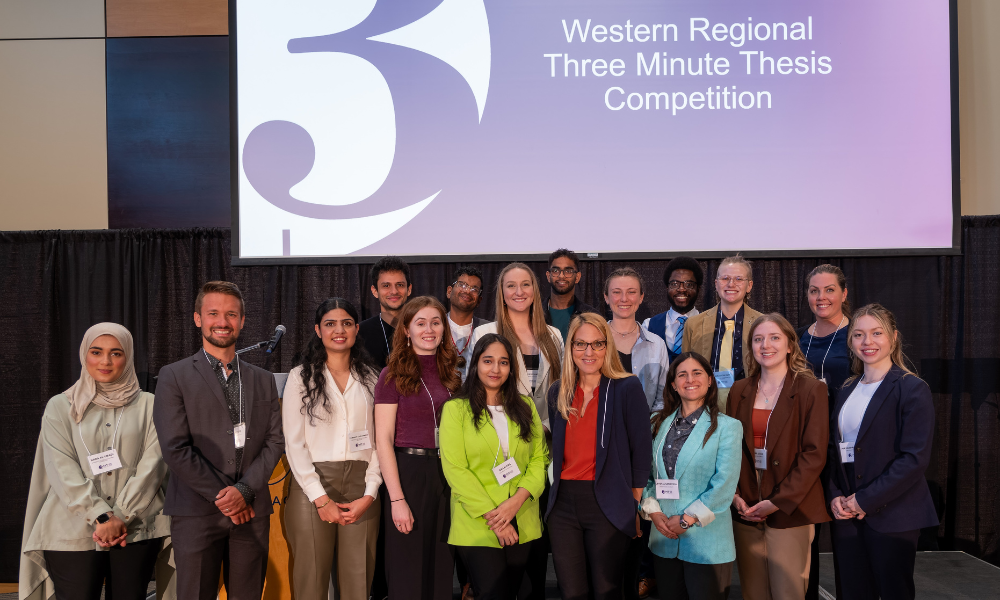
Western Regional 3MT 2024 competitors. Photo credit: Nathan Skolski
From the pool table to the swimming pool, master’s and doctoral students from across Western Canada showed their communication prowess at the 2024 Western Canada Regional Three Minute Thesis (3MT) Competition! Presenting master’s or doctoral research in just three minutes is no small feat. To put it into context, the average person speaks somewhere between 125 and 150 words per minute and the average length of a doctoral dissertation is somewhere between 60,000 to 80,000 words. This means that students need over 530 minutes to share their entire dissertation, but we ask them to do this in just three minutes! The 17 competitors from universities across Western Canada were up for the challenge and dazzled us with their presentation skills.
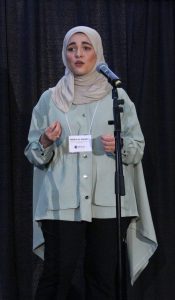
Winner Nada Al-Emadi. Photo credit: Laura Bissell
At the end of the competition, Nada Al-Emadi, Doctor of Philosophy in Microbiology & Immunology student from the University of British Columbia Vancouver took home the top prize of $1,500 with her presentation, “Disarming C. difficile: The Fragmented Approach.” Nada’s research focuses on developing new treatment strategies for C. difficile, a major cause of antibiotic-associated diarrhea known for its high recurrence rates. Nada hopes that her research will result in new therapeutic options for patients suffering from this challenging condition.
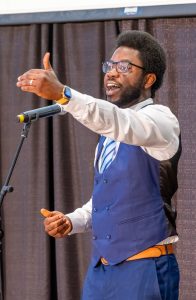
Second place Michael Mensah. Photo credit: Nathan Skolski
Second place went to Michael Mensah, Doctor of Philosophy in Biology student from the University of Regina with his presentation, “Fresh Solutions for Salty Cows.” Michael’s research aims to predict the dynamics of salts in ponds and develop effective management strategies that keep pond water fresh for cows. Michael’s initial findings highlight the opportunities that environmental features, particularly vegetation, offer in addressing issues associated with salty ponds.
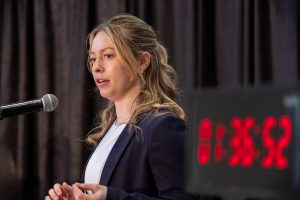
Third place Alexandra Gagnon. Photo credit: Nathan Skolski
Third place went to Alexandra Gagnon, Master of Arts in Sociology student from the University of Alberta with her presentation, “Remand, Release, Reconvict.” Alexandra is part of the University of Alberta Prison Project, which is leading the first systematic Canadian study on formerly incarcerated people’s re-entry experience. The research aims to discover the challenges formerly incarcerated people face in their re-entry to society and create evidence-based policy recommendations to end the cycle of reoffending.
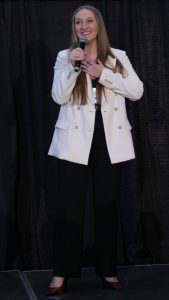
People’s Choice Winner Erin Williams. Photo credit: Laura Bissell
The People’s Choice Award, as voted by the audience, went to Erin Williams, Doctor of Philosophy in Biomedical Physiology and Kinesiology student from Simon Fraser University, with her presentation, “Rhythm beneath the waves: the challenges of fainting during artistic swimming.” Erin’s goal is to describe the physiological mechanisms that contribute to fainting during artistic swimming, including the role that cardiac arrhythmias and breath holding play in these events. Erin’s research works to improve aquatic sport safety, and contributes to understanding the link between drowning and heart irregularities.
Overall, it was a fantastic afternoon full of excitement, connections, and innovative research. Congratulations to the winners and thank you to all participants for visiting our campus and sharing your research with us!